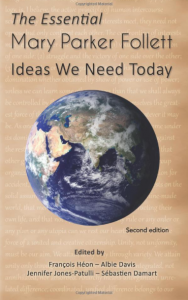Author/Editor:
François Héon
Albie Davis
Jennifer Jones-Patulli
Sébastien Damart
Language:
English
Related Links:
www.amazon.com/Essential-Mary-Parker-Follett-Ideas/dp/0993955304/ref=sr_1_4?ie=UTF8&qid=1536778908&sr=8-4&keywords=Mary+Parker+follett
Resource Type
Book

The Essential Mary Parker Follett: Ideas We Need Today is a comprehensive selection of texts from early 20th-century intellectual pioneer Mary Parker Follett.
Her ground-breaking ideas on leadership, diversity, mediation, management and democracy remain impressively relevant in our modern world. For the first time, these ideas have been selected, organized, and structured by an international team into five topics that encompass her philosophy and works.
This book presents timeless thoughts on uniting, organizing, integrating, leading, and creating democracy – universal themes that are just as significant and applicable to our professional and personal lives today as they were 100 years ago.
About This Book
An international collaboration between four professionals, this book was written and edited with the purpose of providing a doorway into Follett’s thoughts with practical application that can be used across a wide range of fields.
The Essential Mary Parker Follett: Ideas We Need Today is organized into five themes.
Valuing Differences
Follett believed that every individual’s voice was essential to democracy. The differences among people, and the ensuing conflict, were the seeds of innovation. She shows us how differences arising from a single individual, a family, a neighborhood, a nation or internationally can nurture creativity, personal development, social progress and true democracy. We must learn to seek and embrace difference, not fear and avoid it.
Group Organization
Follett presents group organizing as the basic process of social organization, democracy and personal development. She calls group organization the method of coordination and affirms its creative potential for the group and the individual.
The Process of Integration
The process of integration is at the heart of Follett’s philosophy. It is for this reason that we positioned this theme in the middle and at the heart of the book. Integration builds on differences. It goes beyond positions to uncover true interests and to elicit genuine dialogue among participants. Integration is the meeting of differences, to create something new – thus preserving the integrity of the individual.
Leadership
The capacity for humans to be willful co-creators of their lives makes leadership a key method according to Follett for personal and collective development. Her avant-garde notions of power-with management, obeying the law of the situation or of following the invisible leader, are some examples of a leadership philosophy that remains as relevant as ever.
Democracy
Follett defines democracy as the ‘genuine union of true individuals’. Her ideas, brought together from various disciplines, provide a framework that can be applied to leadership, group organization and democracy as a whole. The individual is not subsumed by the group in democracy, but rather is affirmed. Democracy invites us to become more complete individuals as we co-create our worlds.

